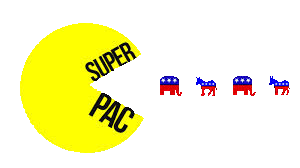We often read articles and letters to the editor from individuals demanding the full disclosure of donors to Super PACs. It is an understandable confusion. News reports regularly warn about the “torrent of dark money” and then go on to talk about Super PACs, or decry the evil of secret money “flooding” our campaigns and then discuss donors to a super PAC independently supporting some major candidate. And so voters and pundits who fight for this cause assume the two, that is, Super PACs and “dark money,” are one and the same.
Of course, this is false. Super PACs do disclose all of their donors, and news outlets regularly use this government-reported information to write articles informing the public about how much some citizens give to these groups.
What is surprising is when this mistake is made, not by an average citizen or even a journalist, but by a politician who really should (or does) know better. Rep. Steve Israel (D-NY) was recently moved by a Newsday article to write a letter to the editor on this topic. Here’s a snippet:
I strongly agree with Newsday’s editorial about the anxiety of Americans.
People know the economy is changing, yet their paychecks remain static, super PACs are drowning out their voices in Washington, and the elite are amassing more wealth and power while the majority of Americans are forced to tread faster than ever just to stay afloat.
Fortunately, there are pragmatic solutions. Here’s a start: First, drastic campaign finance reform requiring overt disclosure of donations to all super PACs.
Remarkably, Rep. Israel appears not to know that his first solution to American anxiety, the “overt disclosure of donations” to Super PACs is already happening. I am sure Rep. Israel, who has served in the House for 15 years and was the head of the Democratic Congressional Campaign Committee until November 2014, will be excited to know that his first policy goal is already the law of the land.
It is amazing to think, however, that a member of Congress tasked with electing more members of his Party to Congress does not actually know one of the most basic rules of campaign finance.
What is really going on here? I see three possibilities.
- Israel doesn’t know or doesn’t care about the differences between PACs and so-called “dark money” groups – a pejorative term for 501(c)(4) advocacy nonprofits, which disclose their identities when running ads, but not the personal information of their donors (many of whom give for reasons entirely unrelated to particular advertisements). He wants government reporting for everyone and everything, legal distinctions be damned. If this is the case, it would have been nice of Rep. Israel to mention that this non-disclosed spending accounts for around 4 percent of overall political spending – though this telling statistic likely would have conflicted with his message about how such spending is dooming America.
- Israel wants even more disclosure from Super PAC donors. It is not enough for donors to provide their name, home address, occupation, and employer to government regulators – perhaps they should also provide their blood type, medical history, a list of all familial relations, and waist size! If this is what Rep. Israel is looking for, it would have been nice if he’d mentioned how much disclosure is already mandated.
- Israel knows that Super PACs disclose, but he deliberately wants to obfuscate the issue. He wants voters to associate Super PACs with secret, dark, evil money, so that every time they see the term they think “those are the bad guys ruining the country, I am going to donate to the other guy.” And if he has to prevaricate to make that happen, so be it.
I sincerely hope the third option isn’t the case. There is enough overwrought rhetoric about campaign finance regulations already. We don’t need respected and established members of Congress actively misleading the public, as well.













